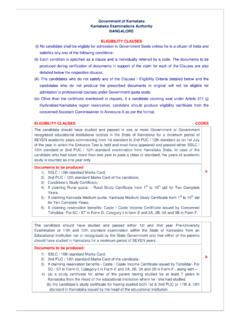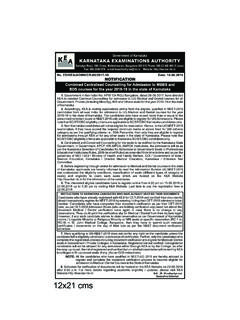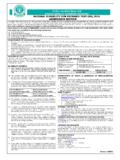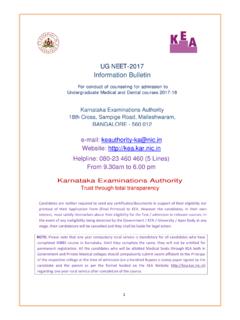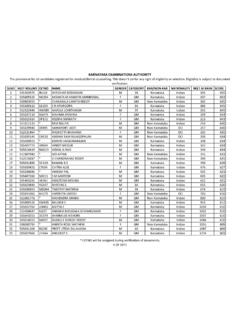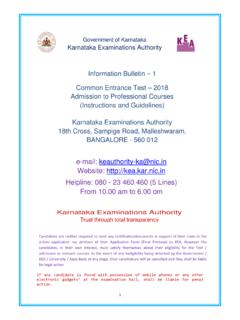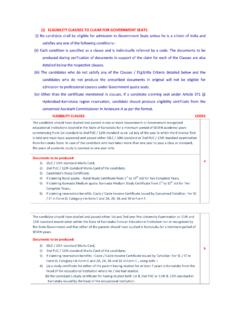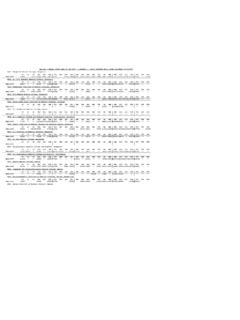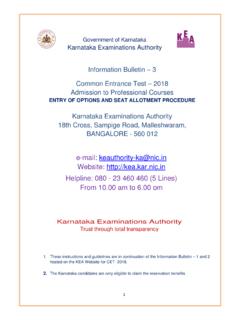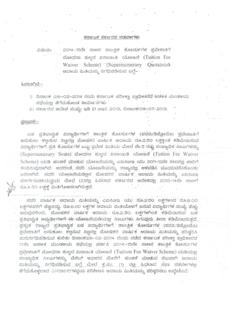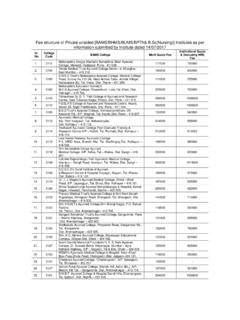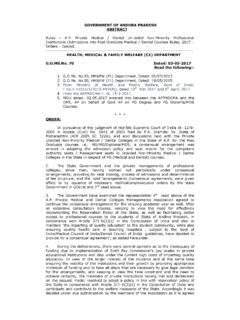Transcription of Karnataka Act No. 8 of 2006 THE KARNATAKA …
1 KARNATAKA Act No. 8 of 2006 THE KARNATAKA professional educational institutions (REGULATION OF ADMISSION AND DETERMINATION OF FEE) ACT, 2006 Arrangement Sections Sections: 1. Short title and commencement 2. Definitions 3. State Common Entrance Test Committee 4. Method of admission in unaided professional educational institutions 5. Admission Overseeing Committee 6. Fee Regulatory Committee 7. Factors for Determination of Fee 8. Eligibility 9. Allocation and reservation of seats 10. Invalidation of admissions made in violation of the Act 11. Fund of the State Common Entrance Test Committee 12. Grants by the State Government 13. Power to borrow 14. Accounts and audit 15. Budget of the Committee 16. Report 17. Protection of action taken in good faith 18. Power of State Government to issue directions 19.
2 Penalties 20. Power to enter and inspect 21. Act to override other laws 22. Power to remove difficulties 23. Power to make rules 24. Transitory provisions STATEMENT OF OBJECTS AND REASONS It is considered necessary to provide for regulation of admission and determination of fee in professional educational institutions in the State of KARNATAKA and to provide for reservation of seats to persons belonging to the Scheduled Castes, the Scheduled Tribes and Other Backward Classes in professional educational institutions . The Hon'ble Supreme Court in its judgement in Islamic Academy of Education and others Vs State of KARNATAKA , reported in (2003) 6 SCC 697, sought to regulate admissions to professional courses through two committees, one for overseeing admissions and the other for approving the fee structure in professional educational institutions , pending enactment of appropriate law by the Parliament.
3 The Supreme Court in and Others Vs State of Maharashtra reported in (2005) 6 SCC 537 has held that where there is more than one minority or non minority institution or similarly situated institution in the State imparting education in any one discipline then a single common entrance test followed by centralised counseling, or in other words, single window system of admission is necessary in order to achieve the twin objectives of transparency and merit. All institutions of the same or similar type, whether minority or non minority institutions will therefore be required to fill their seats through a single common entrance test followed by centralised counseling. Further the Apex Court in the same judgement has held that the State can regulate admission by providing a centralized and single window procedure which will ensure fair and merit based admissions and prevent maladministration.
4 If the admission procedure followed by the private institutions fails to satisfy all or any of the triple tests prescribed by the Court, the admission procedure can be taken over by the State substituting its own procedure. It is also pointed out that minority institutions will lose their minority character if there is more than a "sprinkling" of students from non-minority communities in these institutions . The Apex Court has also clarified that the minority students should be from within the State. Taking this into consideration the Bill provides for sixty six percent of reservation in minority institutions for students from that community within the State. Whereas the population of the Scheduled Castes, Scheduled Tribes and Other Backward Classes exceeds fifty percent of the total population in the State.
5 The Hon'ble Supreme Court in Indirasawhany Vs. Union of India reported in AIR 1993 SC 477 has held that the reservations made for all categories shall not exceed fifty percent. Keeping this in mind the State Government has issued orders providing reservation for the Scheduled Castes, the Scheduled Tribes and Other Backward Classes to the extent of fifty percent under article 15(4) of the Constitution. Article 15 (5) of the Constitution (as inserted by the Constitution (Ninety-third Amendment) Act, 2005 provided for making any special provision by law by the State Government for advancement of any socially and educationally backward classes of citizen or for the Scheduled Castes or the Scheduled Tribes in relation to admission to education institution including private educational institutions whether aided or unaided, other than minority educational institutions notwithstanding anything contained in article 15 and sub-clause (g) of article 19 of the Constitution.)
6 Based on the above policy it is considered necessary to provide for reservation for the Scheduled Castes, the Scheduled Tribes and Other Backward Classes who are socially and educationally backward to the extent of fifty percent in Government, aided and unaided non-minority professional educational institutions . Hence the Bill. [ Bill No. 1 of 2006] KARNATAKA Act No. 8 of 2006 (First published in the KARNATAKA Gazette Extra-ordinary on the twenty fifth day of April, 2006) THE KARNATAKA professional educational institutions (REGULATION OF ADMISSION AND DETERMINATION OF FEE) ACT, 2006 (Received the assent of the Governor on the twenty fourth day of April, 2006) An Act to provide for regulation of admission and determination of fee in professional educational institutions in the State of KARNATAKA and to provide for reservation of seats to persons belonging to the Scheduled Castes, the Scheduled Tribes and Other Backward Classes in the seats in professional educational institutions .
7 Whereas the Hon'ble Supreme Court in its judgement in Islamic Academy of Education and others Vs State of KARNATAKA , reported in (2003) 6 SCC 697, sought to regulate admissions to professional courses through two committees, one for overseeing admissions and the other for approving the fee structure in professional educational institutions , pending enactment of appropriate lay by the Parliament. And whereas the Supreme Court in Inamdar and Others Vs State of Maharashtra reported in (2005) 6 SCC 537 has held that where there is more than one minority or non minority institution or similarly situated institution in the State imparting education in any one discipline then a single common entrance test followed by centralised counseling, or in other words, single window system of admission is necessary in order to achieve the twin objectives of transparency and merit.
8 All institutions of the same or similar type, whether minority or non minority institutions will therefore be required to fill their seats through a single common entrance test followed by centralised counseling. Further the Apex Court in the same judgement has held that the State can regulate admission by providing a centralized and single window procedure which will ensure fair and merit based admissions and prevent maladministration. If the admission procedure followed by the private institutions fails to satisfy all or any of the triple tests prescribed by the Court, the admission procedure can be taken over by the State substituting its own procedure. And whereas, in the Constitution (Ninety-third Amendment) Act, 2005, a provision has been made under article 15(5) as follows:- "(5) Nothing in this article or in sub-clause (g) of clause (1) of article 19 shall prevent the State from making any special provision, by law, for the advancement of any socially and educationally backward classes of citizens or for the Scheduled Castes or the Scheduled Tribes in so far as such special provisions relate to their admission to educational institutions including private educational institutions , whether aided or unaided by the State, other than the minority educational institutions referred to in clause (1) of article 30.
9 " In order to achieve the above object and for the purposes hereinafter appearing it is considered necessary and expedient to provide for the following: Be it enacted by the KARNATAKA State Legislature in the fifty-seventh year of the Republic of India, as follows:- 1. Short title and (1) This Act may be called the KARNATAKA professional educational institutions (Regulation of Admission and Determination of Fee) Act, 2006. (2) It shall come into force on such date as the State Government may, by notification, appoint. 2. (1) In this Act, unless the context otherwise requires,- (a) Admission means admission made at the admission centre; (b) Admission Centre means the centre at which selection and allotment of seats to the candidates to various courses in professional institutions are made through the Common Entrance Test based on merit.
10 (c) "Admission Overseeing Committee" means the committee constituted by the State Government under section 5 for regulating the admissions in private unaided professional educational institutions ; (d) "Aided institution" means a private professional educational institution receiving financial aid or grant-in-aid from the State Government and includes minority and non-minority educational institutions receiving such financial aid or grant; (e) "Common Entrance Test" means the entrance test conducted for determination of merit of the candidates followed by centralized counseling for the purpose of admission to professional educational courses through a single window procedure; (f) Common Entrance Test Cell means the agency of the State Government which conducts the common entrance test; (g) "Fee Regulatory Committee" means the Committee constituted under section 6 for determination and regulation of fee for admission to private unaided professional educational institutions ; (h) "Government" means the State Government.
